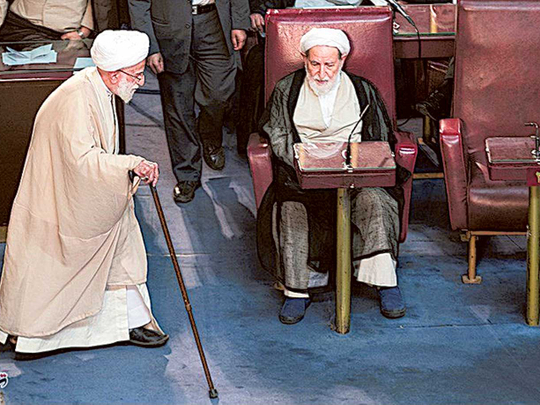
Tehran: Iran’s Assembly of Experts chose ultraconservative Ayatollah Ahmad Jannati on Tuesday to head the key body which oversees the work of the country’s supreme leader and will elect his successor, state television reported.
The 89-year-old cleric is one of the few hardliners who secured reelection in a February vote that saw a landslide for reformists and moderates in the capital and big gains elsewhere.
Jannati was voted chairman of the 88-member Assembly with 51 votes.
No moderates or reformists stood for the post.
Former president Ayatollah Akbar Hashemi Rafsanjani, who had chaired the assembly until 2011 and who topped the polls in Tehran three months ago, did not put his name forward.
Media reports suggested he could muster no more than 20 of the assembly’s votes.
A conservative supported by moderates and reformists, Ayatollah Ebrahim Amini, who leads prayers in the Shiite clerical centre of Qom, won 21 votes.
Former judiciary chief Mahmoud Hashemi Sharhoudi took 13.
Despite the advances for reformists in February’s election, the assembly remains controlled by conservatives.
In Tehran, Rafsanjani won and moderate President Hassan Rouhani came third, but in the provinces conservatives won reelection.
Prominent hardliners lost their seats, however, including outgoing chairman Ayatollah Mohammad Yazdi and Ayatollah Mohammad Taghi Mesbah Yazdi, a close adviser to ex-president Mahmoud Ahmadinejad.
Jannati scraped through in the capital taking the last of its 16 seats on the assembly.
The hardliner also chairs the Guardians Council, the body which vets all candidates for public office in Iran and has a veto over all legislation.
The council sparked controversy in February’s election by disqualifying thousands of hopefuls, most of them reformists.
Jannati’s son Ali is Minister of Culture and Islamic Guidance.
Supreme leader Ayatollah Ali Khamenei is 76 and should he die during the assembly’s eight-year term, it will have the task of electing his successor.
The supreme leader has the final say on all matters of state in Iran, and has far more power than the president.
In a message to the incoming assembly, Khamenei called on its members to remain loyal to the principles of the Islamic revolution of 1979.
“The responsibility is specific — all-around protection of the Islamic and revolutionary identity of the ruling system,” he said.












